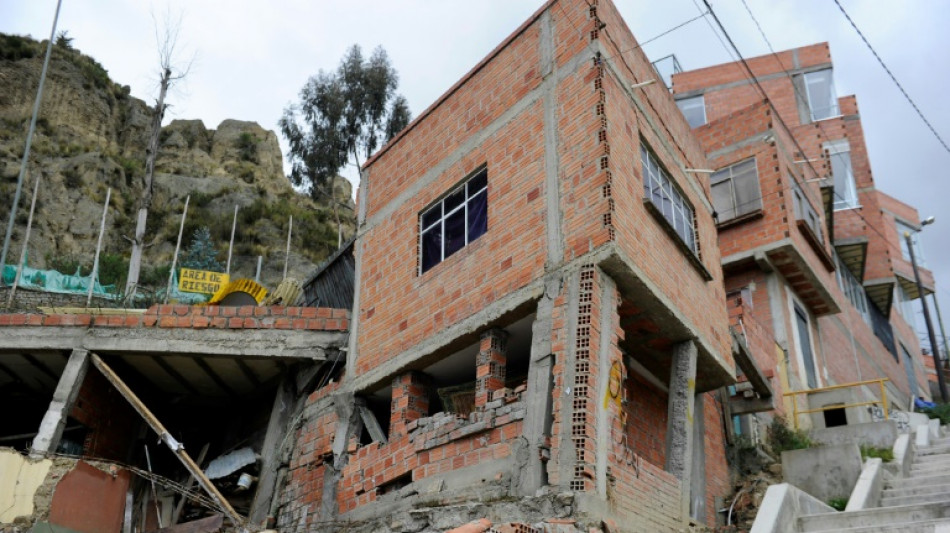
-
 Patriots-Seahawks Super Bowl approaches as politics swirl
Patriots-Seahawks Super Bowl approaches as politics swirl
-
Trump says China's Xi to visit US 'toward the end of the year'

-
 Real Madrid edge Valencia to stay on Barca's tail, Atletico slump
Real Madrid edge Valencia to stay on Barca's tail, Atletico slump
-
Malinin keeps USA golden in Olympic figure skating team event

-
 Lebanon building collapse toll rises to 9: civil defence
Lebanon building collapse toll rises to 9: civil defence
-
Real Madrid keep pressure on Barca with tight win at Valencia

-
 Dimarco helps Inter to eight-point lead in Serie A, Juve stumble
Dimarco helps Inter to eight-point lead in Serie A, Juve stumble
-
PSG trounce Marseille to move back top of Ligue 1

-
 Two prominent opposition figures released in Venezuela
Two prominent opposition figures released in Venezuela
-
Hong Kong to sentence media mogul Jimmy Lai in national security trial

-
 Lillard will try to match record with third NBA 3-Point title
Lillard will try to match record with third NBA 3-Point title
-
Vonn breaks leg as crashes out in brutal end to Olympic dream

-
 Malinin enters the fray as Japan lead USA in Olympics team skating
Malinin enters the fray as Japan lead USA in Olympics team skating
-
Thailand's Anutin readies for coalition talks after election win

-
 Fans arrive for Patriots-Seahawks Super Bowl as politics swirl
Fans arrive for Patriots-Seahawks Super Bowl as politics swirl
-
'Send Help' repeats as N.America box office champ

-
 Japan close gap on USA in Winter Olympics team skating event
Japan close gap on USA in Winter Olympics team skating event
-
Liverpool improvement not reflected in results, says Slot

-
 Japan PM Takaichi basks in election triumph
Japan PM Takaichi basks in election triumph
-
Machado's close ally released in Venezuela

-
 Dimarco helps Inter to eight-point lead in Serie A
Dimarco helps Inter to eight-point lead in Serie A
-
Man City 'needed' to beat Liverpool to keep title race alive: Silva

-
 Czech snowboarder Maderova lands shock Olympic parallel giant slalom win
Czech snowboarder Maderova lands shock Olympic parallel giant slalom win
-
Man City fight back to end Anfield hoodoo and reel in Arsenal

-
 Diaz treble helps Bayern crush Hoffenheim and go six clear
Diaz treble helps Bayern crush Hoffenheim and go six clear
-
US astronaut to take her 3-year-old's cuddly rabbit into space

-
 Israeli president to honour Bondi Beach attack victims on Australia visit
Israeli president to honour Bondi Beach attack victims on Australia visit
-
Apologetic Turkish center Sengun replaces Shai as NBA All-Star

-
 Romania, Argentina leaders invited to Trump 'Board of Peace' meeting
Romania, Argentina leaders invited to Trump 'Board of Peace' meeting
-
Kamindu heroics steer Sri Lanka past Ireland in T20 World Cup

-
 Age just a number for veteran Olympic snowboard champion Karl
Age just a number for veteran Olympic snowboard champion Karl
-
England's Feyi-Waboso out of Scotland Six Nations clash

-
 Thailand's pilot PM lands runaway election win
Thailand's pilot PM lands runaway election win
-
Sarr strikes as Palace end winless run at Brighton

-
 Olympic star Ledecka says athletes ignored in debate over future of snowboard event
Olympic star Ledecka says athletes ignored in debate over future of snowboard event
-
French police arrest six over crypto-linked magistrate kidnapping

-
 Auger-Aliassime retains Montpellier Open crown
Auger-Aliassime retains Montpellier Open crown
-
Lindsey Vonn, skiing's iron lady whose Olympic dream ended in tears

-
 Conservative Thai PM claims election victory
Conservative Thai PM claims election victory
-
Kamindu fireworks rescue Sri Lanka to 163-6 against Ireland

-
 UK PM's top aide quits in scandal over Mandelson links to Epstein
UK PM's top aide quits in scandal over Mandelson links to Epstein
-
Reed continues Gulf romp with victory in Qatar

-
 Conservative Thai PM heading for election victory: projections
Conservative Thai PM heading for election victory: projections
-
Vonn crashes out of Winter Olympics in brutal end to medal dream

-
 Heartache for Olympic downhill champion Johnson after Vonn's crash
Heartache for Olympic downhill champion Johnson after Vonn's crash
-
Takaichi on course for landslide win in Japan election

-
 Wales coach Tandy will avoid 'knee-jerk' reaction to crushing England loss
Wales coach Tandy will avoid 'knee-jerk' reaction to crushing England loss
-
Sanae Takaichi, Japan's triumphant first woman PM

-
 England avoid seismic shock by beating Nepal in last-ball thriller
England avoid seismic shock by beating Nepal in last-ball thriller
-
Karl defends Olympic men's parallel giant slalom crown


'Afraid to live here': urban Bolivia's death-defying homes
Bolivian shopkeeper Cristobal Quispe's humble brick home teeters precariously on the slope of an unstable hillside in La Paz, near the edge of a collapsed road.
The landscape around him is littered with the debris left behind after hundreds of structures were swept away by a mudslide in 2011, including his former house.
Quispe, 74, built a new home not far from where his original had stood.
The abode looks out on half of a park where children used to play. The other half disappeared as the landscape it was built on shifted.
Every year now during the rainy season from November to March, Quispe watches the skies over the world's highest city with trepidation.
"We are afraid to live here. When it rains... there can be a mudslide," Quispe told AFP of life in the Valle de las Flores neighborhood, whose impoverished residents mainly belong to the Aymara Indigenous group.
Despite the municipality declaring the area a perilous "red zone," Quispe and others say they have no choice but to stay there.
Most have lived there all their lives, and many have received title rights from authorities to the land they occupy -- land they hope will be valuable one day.
- 'Highly vulnerable' -
Nestled between the mountains at an altitude of more than 11,500 feet (3,500 meters), La Paz is crisscrossed by more than 300 rivers and streams, making the soil unstable.
Nearly one in five registered properties are in areas of "high" or "very high" risk, according to the municipality, many of them in shanty towns.
Since last November, the government says 16 Bolivians have died in landslides and floods caused by heavy rains.
The problem is not unique to Bolivia, say experts, who blame poor urban planning and a lack of investment in resilience to natural disasters.
"Latin America is highly vulnerable compared to other regions of the world" with "very vulnerable ecosystems," urban development specialist Ramiro Rojas of Bolivia's Univalle private university told AFP.
This, in turn, is "amplified by socioeconomic vulnerability, that is, inequalities and high rates of poverty" that force people to live in unsafe areas.
In the last ten years, at least 13,878 people died in natural disasters in Latin America and the Caribbean, according to data from the Catholic University of Leuven, Belgium.
Urban planner Fernando Viviescas of the National University of Colombia told AFP the threats posed by worsening natural disasters caused by climate change were not taken into account when Latin America's cities were constructed.
Nearly 83 percent of Latin Americans now live in cities, according to the Economic Commission for Latin America and the Caribbean (ECLAC).
- Nowhere to go -
Some 10 minutes by foot from the Valley of the Flowers, on a rocky hill, Cristina Quispe -- no relation to Cristobal -- sells groceries from her home.
Several of the 48-year-old's neighbors recently had to leave as a deluge of mud swallowed up their homes. Like hers, Quispe's neighbor's house was left standing, but now leans at a precarious angle.
"I'm not afraid. I'm calm. Anyway, it's not like I have somewhere else to go," Quispe told AFP.
Elsewhere in La Paz, in a settlement on the banks of the Irpavi river, mechanic Lucas Morales, 62, said he recently lost part of his property to flooding.
"As you can see, one day everything is fine, the next it's destroyed," he said, gesturing around him.
"That's the thing. They gave us the green light to build, but then the river flows through here."
According to Stephanie Weiss, an environmental engineer with the Bolivian Institute of Urbanism, La Paz faces a massive deficit of affordable, safe housing.
And a drive to give ownership of land to disadvantaged people who had long occupied it illegally, has had an unintended consequence of keeping them in unsafe places, she said.
Owning property is viewed as a way for poor people to save for the future, explained Weiss, and many cling to the idea of having their "own home, even if it is on the edge of a cliff."
H.Nasr--SF-PST




